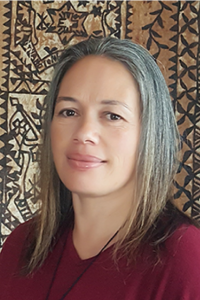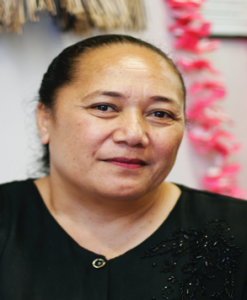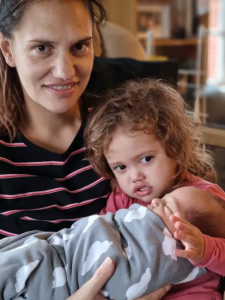Three Te Tumu staff, Pai Taani, Dr Telesia Kalavite and Associate Professor Karyn Paringatai, have been awarded University of Otago Research Grants (UORGs) that will allow them to undertake or further research projects.
The title of Paia Taani’s research project is “I ahatia taku reo Māori? Tracking intergenerational transmission of te reo Māori within whānau”. She says, “my own experiences of learning te reo Māori as a second language and raising my own children with the language sparked my interest to investigate what happened to my language. This research project will therefore investigate the intergenerational transmission of te reo Māori within my whānau.”
Paia’s aim is to is to contribute to the existing research and literature about the use of te reo Māori within the context of whānau. Her research includes analysing whānau narratives to examine the historical intergenerational transmission of te reo Māori and will highlight critical moments within these narratives to explore the factors which affected language transmission within her whānau. The key themes emerging from these accounts will inform future language pathways for her whānau, and may also be used to generate recommendations to offer other whānau who may be seeking to reclaim their language.
The University of Otago Research Grant will help fund travel to the North Island to undertake hui and kōrero with participants, and will also fund a research assistant to undertake transcription work.
Paia expects that she will publish at least two journal articles from her research project, and she will one conference presentation. Another expected output of this research project is a hui with her participants where she will disseminate her findings and discuss ways to move forward with future research and support for whānau wanting to reclaim their language.
Telesia Kalavite’s research project explores “The implications of changing cultural practices in Tongan wedding celebrations in New Zealand”, and how these changes impact on Tongan people’s lives in New Zealand. This project has national and international significance in understanding the development of Tongan culture and identity in the diaspora as well as the myriad cultural, social, economic, political and environmental impacts that are encompassed in Tongan wedding celebrations. It will identify and map out traditional cultural practices in Tongan weddings over time and space. This will provide a context in which to explore contemporary factors affecting Tongan wedding practices in Aotearoa.
Telesia sees this as a pilot study for a larger project in the future on how Tongan celebrations impact on Tongan people’s socio-cultural and economic development in Aotearoa New Zealand. She says “I am a Tongan researcher, and it is very important that to get this kind of research righ; there should be people with clear expertise and connection to it, like myself.”
Karyn Paringatai is collaborating with Marcelle Wharerau, formerly a Te Tumu student and staff member who is now an academic based at the Tauranga campus of Te Pua Wānanga ki te Ao – Faculty of Māori and Indigenous Studies, University of Waikato. Their project is titled “Te Aho Tāngaengae: Māmā, Wahine, Māori, Academic”. Socio-economic stability through intergenerational mobility is a priority of whānau Māori; ensuring that future generations have full access to a range of resources that enhances intergenerational whānau wellbeing. Income, education and occupation feature predominantly in intergenerational mobility studies as primary indicators of social and economic status. However, this focus is too narrow and neglects the importance of also embedding cultural stability and responsibility. Whilst socio-economic stability and upward mobility is a priority of Māori, equally important is the intergenerational transmission of te reo Māori and tikanga Māori.
Colonisation has had profound negative effects on all aspects of te ao Māori, including maintaining intergenerational responsibilities for protecting and enhancing the mana of whānau, hapū and iwi. In this unique research, Karyn and Marcelle aim to show how the reestablishment of this intergenerational responsibility to contribute to the decolonisation of te ao Māori must be a deliberate priority and why it is of urgency to do so.
Te Aho Tāngaengae gives voice to the narratives of wāhine Māori academics who are first in family to complete higher education/university and the mechanisms they employ in the intergenerational transmission of cultural capital. Increasing the capacity, and linguistic and cultural capabilities of Māori across generations who can tangibly contribute to improving the social, economic and political wellbeing of te ao Māori must be a priority. This research is important to reveal new insights into the methods used that have the potential to accelerate transformative change within whānau for generations to come.




